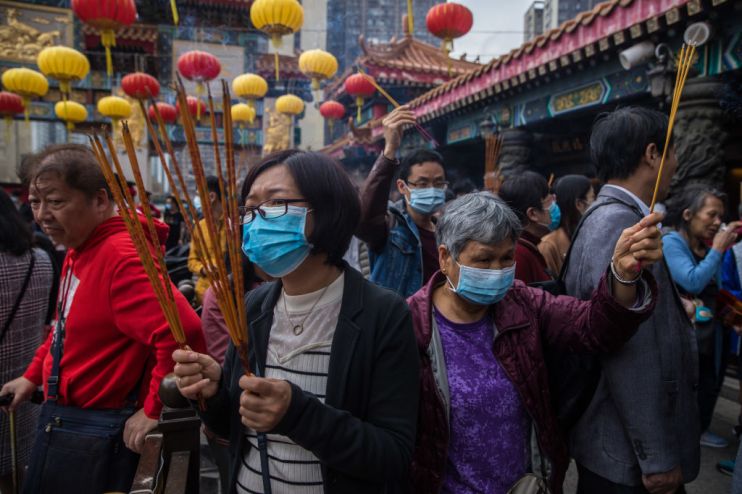FTSE 100 ‘in panic mode’ as coronavirus fears push it into red

FTSE 100 stocks have fallen deep into the red today as fears rise over the spread of coronavirus, which has now claimed 81 lives in China.
Britain’s blue-chip index was down 2.3 per cent by 2pm at 7,412 as hoteliers, airlines and luxury goods firms with links to China suffered.
As the death toll mounted, Beijing extended the Lunar New Year holiday until 2 February to keep people off work, meaning Shanghai and Hong Kong’s stock markets will stay closed until then.
China’s government warned that it expects the spread of the virus to accelerate and confirmed that it can spread in its incubation period, making it harder to tackle.
“The market is back in panic mode about China’s coronavirus,” warned AJ Bell investment director Russ Mould.
“All eyes are on the World Health Organisation,” he said. If it labels the outbreak a global health emergency, “there could be restrictions on international trade and travel, putting pressure on a fragile global economy”.
Investors are increasingly fearful that the extension of the Lunar New Year holiday and government-enforced travel bans will dent China’s already relatively weak economic growth.
Stock markets sank across the board as investors weighed up the threat. France’s Cac 40 fell 2.5 per cent, Germany’s Dax also sank 2.5 per cent, and the Eurostoxx 600 fell 2.2 per cent.
Overnight, Japan’s Nikkei index dropped two per cent, Indonesia’s Jakarta composite index fell 1.5 per cent and India’s S&P BSE Sensex fell 0.5 per cent.
Get the news as it happens by following City A.M. on Twitter
Danske Bank analyst Bjorn Tangaa Sillemann said: “Later this week Chinese PMI figures will be closely watched for any potential negative impact already showing up in service sector activity,” he added. PMI surveys are closely watched indicators of the health of the economy.
Flight to safety
Lee Hardman, currency analyst at Japanese bank MUFG, said coronavirus “provides a setback for the global economy and manufacturing sector which had been showing tentative signs of improvement in recent months”.
“In the FX market it will benefit low yielding and safe-haven currencies such as the yen, Swiss franc and US dollar.”
Investors bought up various safe-haven assets as they sold stocks today. Spot gold rose 0.9 per cent to $1,584.9 and the Japanese yen climbed 0.3 per cent against the dollar.
The yield on the US 10-year Treasury bond fell 7.1 basis points (0.071 percentage points) to 1.617 per cent. Yields move inversely to price.
Across markets, investors sold shares in firms with strong links to China. In the UK, British Airways owner IAG, Intercontinental Hotels, and Easyjet were among the biggest fallers.
Luxury fashion firm Burberry, which has a large Chinese clientele, also suffered.
The FTSE 100’s top 10 fallers
| Stock | Fall (per cent) | Price |
| British Airways owner IAG | 6.3 | 582p |
| Easyjet | 6.1 | 1,392.3p |
| Carnival | 5.8 | 3,232p |
| Intercontinental Hotels | 5.4 | 4,550p |
| Prudential | 5.3 | 1,342.2p |
| Johnson Matthey | 4.7 | 2,660.5p |
| Rolls Royce | 4.6 | 627.8p |
| Rio Tinto | 4.5 | 4,236.5p |
| Anglo American | 4.5 | 2,036p |
| Burberry | 4.4 | 2,007p |
Seema Shah, chief strategist at Principal Global Investors, said the volatile reaction of global stocks to the coronavirus reflects assets’ higher exposure to risk.
“Fears around the spread of the coronavirus are being reflected – violently – in global markets,” she said.
She pointed to the “echo chamber” of social media as one reason for the increased panic. The global nature of companies’ supply chains, particularly those with strong Chinese ties, is another factor.
“Thirdly, asset valuations are at all-time highs,” she pointed out. “With markets ‘priced for perfection’, disruptive events which shake investor sentiment are capable of having outsized influence.”